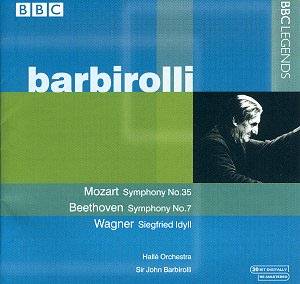Recordings of Sir John Barbirolli have been mainstays
of the BBC Legends series since it began. Often, as here, they emerge
from the collection of the indefatigable Paul Brooks. Outstanding past
issues have been Mahlerís Third (BBCL 4004-7) and Brucknerís Eighth
Symphonies (BBCL 4067-2), both of which I have reviewed here and recommend
to you enthusiastically. Other issues have been more problematic mainly
because of poor sound quality and orchestral playing. However, as these
have all brought recordings of works that Sir John never recorded commercially,
they fill gaps in the discography of a much-loved musician and that
is surely one of the principal values of a series like this.
This present disc is a case in point with three works
taken from different times and places but all with his beloved Halle
Orchestra. The most important is that of Beethovenís Seventh Symphony.
The Beethoven symphonies were a constant presence in Barbirolliís programmes
all through his career but he only ever recorded the First, Third, Fifth
and Eighth commercially. The recording of the Third for EMI with the
BBC Symphony Orchestra is particularly fine and is now available on
Dutton (CDSJB 1008). Hearing such a spacious and sonorous performance
of the "Eroica" might lead you to expect a similar approach
in the Seventh. Not a bit of it. Sir John gave each work that he performed
its own individual interpretation and that is the case here for a work
he clearly felt a great deal for as he programmed it in his 70th
Birthday concert in Manchester. Indeed, as Lyndon Jenkinsís excellent
notes point out, this was coincidentally the last work he ever conducted
in public. Here in 1968 his overall conception of the work imbues it
with great strength and drama but this is never at the expense of tempi
that keep the work moving. Rather itís with a sure stress on the crucial
rhythmic topology of the piece allowing this to govern his view of each
movement that Sir John carries the work through. Take the second and
fourth movements as examples. Under some conductors the second movement
can sound a quasi-funeral march. There is nothing wrong with that but
under Barbirolli the tone of voice is more optimistic and will come
as a surprise to some people who think they know this conductor well.
In the fourth movement there is controlled insistence, a steady pressure,
rather than the mad rush we have become used to in recent years that
builds a great sense of tension into the music. But notice the way Barbirolli
also brings out the militaristic colours in the winds that give it real
character and presence. This Beethoven Seventh also has the best sound
on the disc though it does betray the dry Royal Festival Hall acoustic
along with the fact that it was taken off-air bringing some limitation
in tone colours.
The performance of Mozartís "Haffner" Symphony
is from a Promenade Concert at the Royal Albert Hall in 1967, the first
half of one of Barbirolliís "Viennese Nights". This might
explain the jauntiness and high spirits throughout. Especially the liberal
displays of string dynamics, maybe limbering up for the Strauss Family
music to come in the second half. (Is there a Barbirolli "Viennese
Night" available to BBC Legends, I wonder?). This is "big
band" Mozart very much of its time with a first movement notable
for thrust and power and a superbly dashing last movement. The sound
is wide and big-boned but has a tendency to the top end that might need
a treble cut on your amplifier.
Finally we have Wagnerís "Siegfried Idyll"
in a Manchester studio recording. The sound here is rather boomy and
cloudy though it is clear enough to hear the details of an affectionate,
long-breathed performance with more than a touch of Elgarian nobilmente
in the woodwind interludes. There is also a glow about the conclusion
of the work that few conductors today would even attempt, with a slow
tempi sustained with great line and depth. Not a performance of this
lovely work I would reach for every time, though, but good to have in
my collection.
Three more works from the Barbirolli repertoire in
fair sound and good performances.
Tony Duggan

![]() Halle Orchestra/Sir John
Barbirolli
Halle Orchestra/Sir John
Barbirolli ![]() BBC Legends BBCL 4076-2
[74.01]
BBC Legends BBCL 4076-2
[74.01]